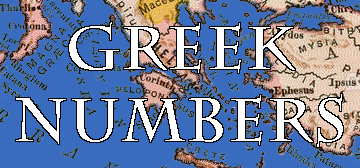



I read years ago, that the ancient Greeks hated the number ‘2’, and it took me many years to come up with a plausible reason:
The answer is that ‘2’ does not exist except in the human mind. You can have one orange sitting on your table, and if you put another beside it you can say by human logic that there are now ‘two oranges on the table’. But the oranges are not the same as each other: they are of different shapes and colours; they consist of different physical matter; they occupy different positions in space; they each have a unique life history. Certainly they have similarities, but they are not the same. The group term ‘orange’, refers to the similarities but does not preclude the differences.
Numbers are mental labels: ‘orange No.1’ and ‘orange No.2’ They exist only insofar as our mental generalisation of ‘orange’ holds true. When you used the word ‘orange’ you had a great number of qualities in mind but didn't bother to state them. That is what group terms do: they make life simpler and easier. But did you mean just ‘an orange coloured citrus fruit’ or did you mean ‘an orange coloured citrus fruit that is all juicy on the inside’. When you cut the oranges to make your orange juice you may find that one of them is all dry on the inside and yields no juice. The arithmetic has led you on to an erroneous conclusion.
Group terms and numbers are mental constructs. To say that ‘one of anything exists’ is a logical statement that no philosopher in recorded history has ever been able to substantiate (see ‘objectification’) but to extend the induction to the concept of multiple items possessing identical qualities is a vast leap of generalisation.
Of course we do it all the time — we have to. It is one of the necessary simplifications required for describing our world and communicating with others. However, it becomes an obstruction to truth and true communication when we forget that it is a simplification.
* * * * *
An Extra Note
The ancient Greek philosophers contemplated unity, the concept of number, plurality, quantity, measure and their concept of arithmos. The following are some significant extracts.
Plato in the dialogue ‘Greater Hippias’, defines ‘arithmos’ as: ‘A property of a group that belongs only to the group, not the individuals, and applies to the group only insofar as the individuals are considered to be identical’.
Moderatus (neo-Pythagorean, 60 A.D.) defines ‘arithmos’ as: ‘a progression of multitude beginning from a unit and a regression ending in it.’
Aristotle of course, had a lot to say:
Metaphysics Delta 13, 1020a8-14:
Quantity [poson, literally ‘how much’ or ‘how many’] is said to be that which is divisible into constituents, each of which is by nature one [or ‘a one’] and a ‘this’ [tode ti, a specific indicable thing]. A plurality [plethos] is a kind of quantity if it [the quantity] is numerable [countable; arithmeton]; a magnitude is a kind if quantity if it [the quantity] is measurable. A plurality is said to be that which is divisible potentially into parts which are not continuous; a magnitude, on the other hand, is that which is potentially divisible into parts which are continuous ... Of these, a limited [peperasmenon] plurality is said to be a arithmos, a limited length a line, a limited width a surface, and a limited depth, a body.
Metaphysics Iota (I) 6, 1057a2-6:
Plurality is as if it were [or ‘such as’; hoion] a genus of arithmos; for arithmos is a plurality measurable by the one. And in some sense [or ‘in a way’] the one and arithmos [or ‘a arithmos’] are opposed, not as contraries, but ... as some relative things are; for the one in so far as it is a measure is opposed to arithmos in so far as arithmos is measurable.
Metaphysics Nu (N) 1, 1087b33-1088a15:
The one signifies a measure, evidently. And in each case there is some different underlying subject [hupokeimenon, thing laid down], such as in the musical scale a quarter-tone; in magnitude a finger or a foot or some other such thing; and in rhythm a beat or a syllable ... And this is also according to formula [or ‘definition’ or ‘account’: logos]; for the one signifies a measure of some plurality and the arithmos signifies a measured plurality [a plurality that has been measured] and a plurality of measures. Therefore it is also with good reason that the one is not a arithmos; for neither is a measure measures, but a measure is a principle [or ‘source’, arche], and so is the one.
* * * * *